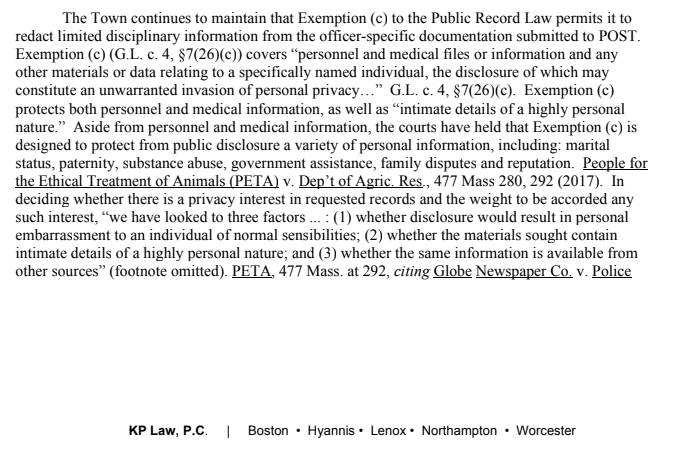Exemption (c), Legislative History, and Judicial Misinterpretations: A Quick Examination in the Context of POST Records

During this whole POST Commission records effort, a fun game I play with myself is observing the new and novel ways these agencies try to deny these records. The police departments truly do not like the fact that the exemption for their personnel files "shall not apply to records related to a law enforcement misconduct investigation," and they've relied on irrelevant lawsuits and spurious claims to withhold public documents. It's not working, if my 320ish appeals to the Supervisor of Records is any indication, but the efforts make for some fun reading.
One that stuck in my craw, though, involved a fairly novel interpretation of both the judicial and legislative history of what, to my untrained eye, seemed like a direct bit of language. I hinted at this earlier, but I feel like it deserves a closer look.

The most persistent proponent of this interpretation is K-P Law. They would write:
After an individual assessment of the records, please be advised that personnel information regarding specifically identified individuals contained in the enclosed charts submitted to the POST Commission by the Department has been redacted from the enclosed pursuant to Exemption (c) of the Public Records Law. Exemption (c) to the Public Records Law, G.L. c. 4, §7(26)(c) covers “personnel and medical files or information and any other materials or data relating to a specifically named individual, the disclosure of which may constitute an unwarranted invasion of personal privacy...” G.L. c. 4, §7(26)(c). Exemption (c) protects both personnel and medical information, as well as “intimate details of a highly personal nature.” Aside from personnel and medical information, the courts have held that Exemption (c) is designed to protect from public disclosure a variety of personal information, including: marital status, paternity, substance abuse, government assistance, family disputes and reputation. People for the Ethical Treatment of Animals (PETA) v. Dep’t of Agric. Res., 477 Mass 280, 292 (2017). In deciding whether there is a privacy interest in the requested records and the weight to be accorded any such interest, “we have looked to three factors ... : (1) whether disclosure would result in personal embarrassment to an individual of normal sensibilities; (2) whether the materials sought contain intimate details of a highly personal nature; and (3) whether the same information is available from other sources” (footnote omitted). PETA, 477 Mass. at 292, citing Globe Newspaper Co. v. Police Comm'r of Boston, 419 Mass. 852, 858 (“Police Comm'r of Boston”). “ ‘[O]ther case-specific relevant factors’ may [also] influence the calculus.” PETA, supra, quoting Police Comm'r of Boston, supra.
With respect to personnel documentation, the courts have in the past determined that disciplinary and other personnel documentation included in the investigation materials sought in this request are “absolutely exempt from disclosure,” as non-disclosure protects “the government’s ability to function effectively as an employer.” Wakefield Teachers Association v. School Committee of Wakefield, 431 Mass. 792, 799, 802 (2000); see also Globe Newspaper Co. v. Boston Retirement Bd., 388 Mass. 427, 438 (1983); Brogan v. School Committee of Westport, 401 Mass. 306, 308 (1987). Indeed, specifically with respect to disciplinary documentation related or resulting from a Police Department internal affairs investigation, the courts had determined that such documentation is exempt from disclosure under Exemption (c). See, e.g, Worcester Telegram & Gazette Corp. v. Chief of Police of Worcester, 58 Mass. App. Ct. 1, 5 (2003).
As my appeals continued coming down in favor of disclosure, I would continue to see this argument from K-P Law anyway, albeit with an additional twist:
In this instance, the Department has carefully considered the application of Exemption (c) to the redacted charts enclosed, to determine whether disclosure of the information that has been redacted or withheld is such that the public’s right to know outweighs any individual officer’s privacy rights, and considered the factors set forth in the PETA case, cited above. It continues to be the Department’s position that in balancing these interests, it is appropriate to redact certain personnel information from the records previously provided to you, which is otherwise part of an employee’s personnel file, under Exemption (c). While the Department acknowledges the statutory amendments to Exemption (c) enacted as part of the Police Reform Act, it is the Department’s position that there is nothing in the revised Exemption (c) that expressly abrogates the Worcester Telegram & Gazette Corp. v. Chief of Police of Worcester decision (58 Mass. App. Ct. 1, 5 (2003)), which expressly considered what information related to internal affairs investigation files was subject to public disclosure. There is a legal distinction between confidential personnel information and internal affairs or law enforcement misconduct investigative materials. Therefore, revised Exemption (c) can be interpreted as simply codifying the holding of Worcester Telegram & Gazette, in which instance redacting the express discipline imposed in any particular situation involving a police officer is consistent with the amended Exemption (c)... Until such time as either the courts or the Supervisor of Records determines the full scope and extent of the application of the revisions to Exemption (c), it is the Department’s position that it may appropriately continue to redact (or where appropriate withhold entirely) disciplinary documentation.
Emphasis mine. There's a lot of legalese there, and while I'm not a lawyer, this is one of those cases where you really only need an internet connection to figure out that the information provided in defense of withholding and redaction is bad.
This story ultimately starts in 2003 with the Worcester Telegram & Gazette case. The T&G made a records request to the City of Worcester for a complaint file related to a 1999 police incident. Worcester withheld the records in full citing the criminal offender record information (CORI) statute, as well as what was described as "the categorical exemption for 'personnel [file] or information' [the public records exemption] is intended to encompass." The City withheld the records because they saw multiple exemptions in play.
The Supreme Judicial Court (SJC) saw the records in question as three groups: communications with the complainant, police reports and other investigatory materials, and "documents from the internal affairs investigation proper." The SJC was fairly direct in how they viewed these documents:
The Group I and Group II documents do not even arguably fall within any accepted interpretation of the term "personnel [file] or information." These materials do not include Tarckini's employment application, any internal evaluations, payroll records, injury reports or performance assessments. Nor do they include information about his education and qualifications for employment... These also do not constitute disciplinary reports, disciplinary documentation, or promotion, demotion, or termination information and hence "personnel [file] or information"...
Group III presents a closer question. The officers' reports, the witness interview summaries, and the internal affairs report itself clearly bear on the ultimate decision by the chief to discipline or to exonerate Officer Tarckini based upon the investigation. However, that these documents bear upon such decisions does not make their essential nature or character "personnel [file] or information." Rather, their essential nature and character derive from their function in the internal affairs process.
An internal affairs investigation is a formalized citizen complaint procedure, separate and independent from ordinary employment evaluation and assessment. Unlike other evaluations and assessments, the internal affairs process exists specifically to address complaints of police corruption (theft, bribery, acceptance of gratuities), misconduct (verbal and physical abuse, unlawful arrest, harassment), and other criminal acts that would undermine the relationship of trust and confidence between the police and the citizenry that is essential to law enforcement. The internal affairs procedure fosters the public's trust and confidence in the integrity of the police department, its employees, and its processes for investigating complaints because the department has the integrity to discipline itself.
The case ultimately came out to say that "the same information may simultaneously be contained in a public record and in exempt 'personnel [file] or information,'" CORI implications or not, and functionally ordered the release of the records. In an earlier paragraph, the SJC further noted that "[i]t would be odd, indeed, to shield from the light of public scrutiny as 'personnel [file] or information' the workings and determinations of a process whose quintessential purpose is to inspire public confidence." Put all together, a pretty convincing case can be made that Worcester Telegram favors the disclosure of disciplinary records on net, contrary to what is argued by K-P Law and others.
If anything, I'd argue that the change to exemption (c) codifies the end of any remaining debate on whether police disciplinary records are public. K-P Law argues, however, that the courts and legislature haven't spoken clearly on this, and the Plymouth Police Department goes a step further:

The court held that most documents relating to the internal affairs file—such as the officer reports, witness interview summaries, and the internal affairs report itself—were not covered by the personnel exemption, despite likely having some bearing on the decision whether to discipline or exonerate an employee... Instead, the court found personnel records are those that are “useful in making employment decisions,” such as “employment applications, employee work evaluations, disciplinary documentation, and promotion, demotion, or termination information pertaining to a particular employee” were exempt from disclosure...
As far as we have found, there is a dearth of guidance or legislative history on this matter. It appears the clause was written identically in the proposed versions of the bill from each house of the General Court and was not considered by the legislative conference committee. Nor is the phrase “police misconduct” defined by statute anywhere in the General Laws, or has the Supervisor undertaken any effort to define its scope and whether it would apply to, say, both instances of tardiness and major corruption...
Neither the Supervisor nor any Court has interpreted exactly how far the amendments to Exemption (c) are intended to extend.
While the Plymouth argument also veers off into hypotheticals surrounding medical records and a chilling effect on witnesses, I found the legislative history angle curious. Certainly, something of this magnitude, with this level of vitriol from police interests, got some play, right?
As best I could, this is the timeline I can pull together:
- Following the murder of George Floyd, then-Governor Charlie Baker submits a police reform bill to the Massachusetts House in 2020. Page 10 of 18 is in the middle of the section about a broad database of officers that would include training and employment records along with "the date of any sustained internal affairs complaint, and the charge sustained."
This closes out with as firm a statement as one can get: "The information in the database shall be a public record as defined in clause twenty-sixth of section 7 of chapter 4." - The final language of the initial bill mirrors what is in exemption (c) today, and is a broader amount of records than what the governor initially proposed. Further, Governor Baker was unhappy with aspects of the bill and threatened a veto without a series of changes; none of these requested changes touched the new language of exemption (c). As the Baker Administration went pretty deep in their critiques of the bill, one would assume a concern would be lodged if it existed. It was not.
- The House takes up the Baker amendments. They separated the governor's proposed amendments into three buckets, but there were also other amendments. Relevant to us? A different proposed database, and broader protection for police personnel files were proposed and both withdrawn.
Representative Patrick Kearney of Scituate had the only other amendment relevant to the public records statute where he outright attempted to strike the language. This effort received two co-sponsors and was similarly withdrawn.
When I spoke with Rep. Kearney on 19 September 2023, he explained to me that the motivation behind the amendment was not about keeping these records from the public, but instead about the danger expressed by police officers in his area about the disclosure of ongoing investigations and of home addresses, specifically citing activists "out with bullhorns" at elected officials' houses and protesters blocking Baker's driveway as examples of what he sought to avoid. He did reiterate that the amendment was withdrawn, and said that he got the message from the House Judiciary chair that they weren't going to touch the records portion of the bill.
As noted, I'm not a lawyer. My degree was in history and political science. While nothing can be wholly definitive through a handful of letters, phone conversations, and amendment trackers, we can make some pretty strong assumptions here given the record. The weight of the evidence, to me, is that a) most everyone agreed that there would be publicly accessible police records, b) the Democratic legislature went further than the Republican governor in the transparency ask, c) that the change to exemption (c) was fairly uncontroversial, and d) that the one effort to remove the change to exemption (c) failed.
Now, I'm not an idiot. I know that no one in their right mind is going to these lengths to figure this out (and yes, I know what I said). I certainly don't expect a sergeant on the Cape to do it, and this is likely out of the wheelhouse of your run-of-the-mill municipal lawyer. But the information is out there, and for as much of an authoritative voice these lawyers and officers like to use to scare off requestors, if you're pushing for transparency, the law is most likely on your side.
Now, if we can only get the legislature and courts to offer a more transparent experience, it wouldn't take me 2,200 words for an explainer. Or 320 appeals to the Public Records Division.
Jeff Raymond is Founding Editor of The Bramanville Tribune and co-host of Lights Out, Mass with Andrew Quemere. He can be reached at jeff.raymond@masstransparency.org or on Twitter at @jeffinmillbury